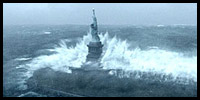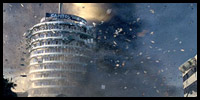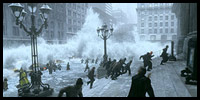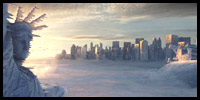
 |
|
The Day After Tomorrow (2004) Cast: Dennis Quaid, Jake Gyllenhaal, Emmy Rossum, Sela Ward, Ian Holm, Dash Mihok, Jay O. Sanders, Arjay Smith, Austin Nichols, Tamlyn Tomita, Adrian Lester, Glenn Plummer, Kenneth Walsh, Sheila McCarthy, Perry King, Luke Letourneay 2004 – 124 minutes Rated: Reviewed by Dustin Putman, May 28, 2004.  "The Day After Tomorrow" is writer-director Roland Emmerich's fourth chance to do justice to the science-fiction genre (after 1994's boderline-plagiaristic "Stargate," 1996's insipid and corny "Independence Day," and 1998's just-plain-bad "Godzilla"), and he is no closer to succeeding at making a smart, taut, well-written motion picture than he was ten years ago. Even his attempt at historical drama, 2000's "The Patriot," was a preachy, flag-waving bust. Through all five of these features, Emmerich has had a knack for concocting grandly themed, highly accessible, intriguingly plotted films and then completely watering them down in wasted potential, giant cliches, and ridicule-worthy scripting. "The Day After Tomorrow" reminds of the Irwin Allen films of the '70s (i.e. "The Poseidon Adventure," "The Towering Inferno"), but exempt of their undeniable fun factor and sharper-than-usual character depth. As cheesy as Allen's oeuvre may have been, they were an example of great subtlety and plausibility in comparison to what Emmerich's slick, empty, and often laughable latest production has to offer.
"The Day After Tomorrow" is writer-director Roland Emmerich's fourth chance to do justice to the science-fiction genre (after 1994's boderline-plagiaristic "Stargate," 1996's insipid and corny "Independence Day," and 1998's just-plain-bad "Godzilla"), and he is no closer to succeeding at making a smart, taut, well-written motion picture than he was ten years ago. Even his attempt at historical drama, 2000's "The Patriot," was a preachy, flag-waving bust. Through all five of these features, Emmerich has had a knack for concocting grandly themed, highly accessible, intriguingly plotted films and then completely watering them down in wasted potential, giant cliches, and ridicule-worthy scripting. "The Day After Tomorrow" reminds of the Irwin Allen films of the '70s (i.e. "The Poseidon Adventure," "The Towering Inferno"), but exempt of their undeniable fun factor and sharper-than-usual character depth. As cheesy as Allen's oeuvre may have been, they were an example of great subtlety and plausibility in comparison to what Emmerich's slick, empty, and often laughable latest production has to offer.
 Just days after climatologist Jack Hall (Dennis Quaid) warns that global warming may be only fifty to one-hundred years away, the world's northern hemisphere is suddenly stricken by massive hurricanes, floods, and blizzards, destroying entire cities in their wake. With his teenage son, Sam (Jake Gyllenhaal), off in Manhattan at a scholastic competition when catastrophe hits, Jack promises Sam that he will make it from D.C. to New York to save him, no matter what. In order to do this, however, Jack and Sam will both have to fight for survival as the new Ice Age, taking temperatures down to 150 degrees below zero, approaches.
Just days after climatologist Jack Hall (Dennis Quaid) warns that global warming may be only fifty to one-hundred years away, the world's northern hemisphere is suddenly stricken by massive hurricanes, floods, and blizzards, destroying entire cities in their wake. With his teenage son, Sam (Jake Gyllenhaal), off in Manhattan at a scholastic competition when catastrophe hits, Jack promises Sam that he will make it from D.C. to New York to save him, no matter what. In order to do this, however, Jack and Sam will both have to fight for survival as the new Ice Age, taking temperatures down to 150 degrees below zero, approaches.
 An environmental cautionary tale and a big-budget, special effects-laden disaster flick, "The Day After Tomorrow" takes a potentially thought-provoking premise and flounders the results miserably. The most treacherous culprit is the asinine screenplay by Roland Emmerich and Jeffrey Nachmanoff, which not only steals from Emmerich's own "Independence Day," but is more than content to parade out an endless, ever-wearying line of cliches, ludicrous plotting and dialogue, and paper-thin stock characters whom the viewer forms no relationship with. There's a friendly bum (Glenn Plummer) and his trusty dog. There's a dedicated nurse (Sela Ward) who sacrifices her own safety for a young cancer patient. There's a news anchor on the streets of Hollywood who does his report feet away from one of the cyclones ravaging the city (he gets what he deserves in the long run for being so stupid). There's even a threadbare romantic subplot between Sam and cute classmate Laura (Emmy Rossum) that is actually brought up in an earnest, calm fashion by another character mere seconds after they all were nearly wiped out in a tidal wave. When the fatally cold temperatures hit, turning people into frozen popsicles in mere seconds, the lead actors conveniently are able to escape such maladies by simply closing the door of a building or taking shelter in a flimsy tent.
An environmental cautionary tale and a big-budget, special effects-laden disaster flick, "The Day After Tomorrow" takes a potentially thought-provoking premise and flounders the results miserably. The most treacherous culprit is the asinine screenplay by Roland Emmerich and Jeffrey Nachmanoff, which not only steals from Emmerich's own "Independence Day," but is more than content to parade out an endless, ever-wearying line of cliches, ludicrous plotting and dialogue, and paper-thin stock characters whom the viewer forms no relationship with. There's a friendly bum (Glenn Plummer) and his trusty dog. There's a dedicated nurse (Sela Ward) who sacrifices her own safety for a young cancer patient. There's a news anchor on the streets of Hollywood who does his report feet away from one of the cyclones ravaging the city (he gets what he deserves in the long run for being so stupid). There's even a threadbare romantic subplot between Sam and cute classmate Laura (Emmy Rossum) that is actually brought up in an earnest, calm fashion by another character mere seconds after they all were nearly wiped out in a tidal wave. When the fatally cold temperatures hit, turning people into frozen popsicles in mere seconds, the lead actors conveniently are able to escape such maladies by simply closing the door of a building or taking shelter in a flimsy tent.
 Yes, "The Day After Tomorrow" is the kind of movie one should check their brain at the door of, but is it too much to ask to treat the subject matter with some form of maturity and realism? Even a set of laid ground rules would have helped had director Emmerich not violated them whenever it was convenient to the plot. Instead, he condescends to his audience by expecting them to be dimwits with IQ's in the single digits. The consistent, innumerable flaws found in the writing block most of the cathartic entertainment value that might have been had from the story. Disappointing, also, is how briefly and vaguely the weather disasters are portrayed onscreen. After a five minute scene centering on the destruction of Los Angeles by tornadoes (and including the obligatory shot of the Hollywood sign being ripped to shreds), the city is never seen or heard from again. The majority of the seen disasters occur in Manhattan (very few other places being torn apart in the world are glimpsed), but again, it is over nearly before it begins. With most of the action set-pieces and money shots exhausted by the end of the first hour, Roland Emmerich's largest hindrance is exposed. With no development placed on the characters and their relationships outside of the rudimentary, there is nothing to carry the viewer through the long, slow, monotonous second half. Focus alternates between Sam, as he takes shelter in a library, and Jack, who braves the snow and frigid temperatures to trek hundreds of miles (by foot) to reach his son. The film forgets to give us a reason to care, and its negligence in building real personalities for its stick characters only makes the subdued final hour all the more patience-testing.
Yes, "The Day After Tomorrow" is the kind of movie one should check their brain at the door of, but is it too much to ask to treat the subject matter with some form of maturity and realism? Even a set of laid ground rules would have helped had director Emmerich not violated them whenever it was convenient to the plot. Instead, he condescends to his audience by expecting them to be dimwits with IQ's in the single digits. The consistent, innumerable flaws found in the writing block most of the cathartic entertainment value that might have been had from the story. Disappointing, also, is how briefly and vaguely the weather disasters are portrayed onscreen. After a five minute scene centering on the destruction of Los Angeles by tornadoes (and including the obligatory shot of the Hollywood sign being ripped to shreds), the city is never seen or heard from again. The majority of the seen disasters occur in Manhattan (very few other places being torn apart in the world are glimpsed), but again, it is over nearly before it begins. With most of the action set-pieces and money shots exhausted by the end of the first hour, Roland Emmerich's largest hindrance is exposed. With no development placed on the characters and their relationships outside of the rudimentary, there is nothing to carry the viewer through the long, slow, monotonous second half. Focus alternates between Sam, as he takes shelter in a library, and Jack, who braves the snow and frigid temperatures to trek hundreds of miles (by foot) to reach his son. The film forgets to give us a reason to care, and its negligence in building real personalities for its stick characters only makes the subdued final hour all the more patience-testing.
 "The Day After Tomorrow" has the possibility of becoming a camp classic for its failure to accumulate intended laughs while somehow turning its more serious moments into genuine howlers. The exception is its heavy-handed but still effective jabs at today's ailing political climate. The President of the United States (Perry King) is portrayed, intentionally like George W. Bush, as a useless figure who relies on everyone else to tell him what to do, while the Vice President (Kenneth Walsh) isn't seen in a much more positive light. When most movies portray politicians with honorability and intelligent, it is refreshing to finally see one that acknowledges their flaws and denies sugarcoating. It is too bad, then, that the rest of the picture isn't nearly as astute or canny. The usually great actors, particularly Dennis Quaid (2003's "Cold Creek Manor") and Jake Gyllenhaal (2002's "The Good Girl"), struggle to keep straight faces while having to recite such cornball dialogue it is amazing no one realized how bad it was while they filmed it.
"The Day After Tomorrow" has the possibility of becoming a camp classic for its failure to accumulate intended laughs while somehow turning its more serious moments into genuine howlers. The exception is its heavy-handed but still effective jabs at today's ailing political climate. The President of the United States (Perry King) is portrayed, intentionally like George W. Bush, as a useless figure who relies on everyone else to tell him what to do, while the Vice President (Kenneth Walsh) isn't seen in a much more positive light. When most movies portray politicians with honorability and intelligent, it is refreshing to finally see one that acknowledges their flaws and denies sugarcoating. It is too bad, then, that the rest of the picture isn't nearly as astute or canny. The usually great actors, particularly Dennis Quaid (2003's "Cold Creek Manor") and Jake Gyllenhaal (2002's "The Good Girl"), struggle to keep straight faces while having to recite such cornball dialogue it is amazing no one realized how bad it was while they filmed it.
 The visual effects in "The Day After Tomorrow" are professional eye-candy, and the tidal wave sequence is good for a few valid thrills, but that is where the excitement ends. Most of the running time is merely plodding, and the film's portrayal of a frozen Manhattan wasteland was far more chilling and convincing in 2001's brilliant "A.I.: Artificial Intelligence." Likewise, the twisters in 1996's "Twister" were better. Regrettably, the film even pales in comparison to "Independence Day," which was also just one stereotypical, creatively discouraging moment after the next, but at least felt like its scope was larger. So much could have been done with the ingenious premise of global warming. The tragedy of "The Day After Tomorrow" is that it does nothing at all with these boundless story possibilities, happy to be lazy and patronizing, instead. Mr. Emmerich—you've officially just struck out.
The visual effects in "The Day After Tomorrow" are professional eye-candy, and the tidal wave sequence is good for a few valid thrills, but that is where the excitement ends. Most of the running time is merely plodding, and the film's portrayal of a frozen Manhattan wasteland was far more chilling and convincing in 2001's brilliant "A.I.: Artificial Intelligence." Likewise, the twisters in 1996's "Twister" were better. Regrettably, the film even pales in comparison to "Independence Day," which was also just one stereotypical, creatively discouraging moment after the next, but at least felt like its scope was larger. So much could have been done with the ingenious premise of global warming. The tragedy of "The Day After Tomorrow" is that it does nothing at all with these boundless story possibilities, happy to be lazy and patronizing, instead. Mr. Emmerich—you've officially just struck out.
|
© 2004 by Dustin Putman |














